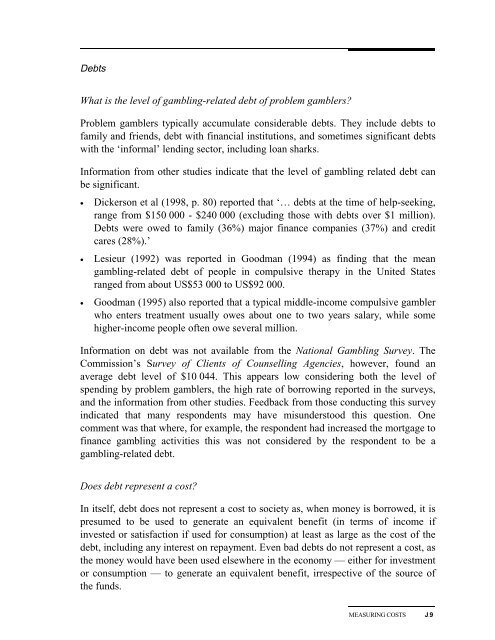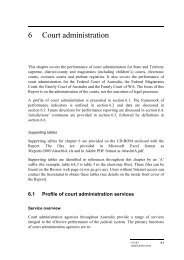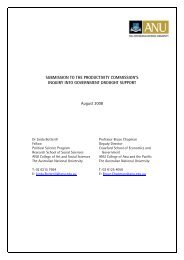- Page 1 and 2:
Australia’s Gambling Industries I
- Page 3:
Contents of other volumes Volume 1
- Page 6 and 7:
Australian Capital Territory Federa
- Page 8 and 9:
Tasmania Wrest Point Casino New Zea
- Page 10 and 11:
Marianne James Prof Jan McMillen Pe
- Page 12 and 13:
Canberra, 30 November 1998 Senator
- Page 14 and 15:
Sydney, 16-17 September 1999 Rev Fr
- Page 16 and 17:
N Ward 28 Evelyn Jago 29 Territory
- Page 18 and 19:
Australian Hotels Association (SA)
- Page 20 and 21:
Women’s Health West 176 Norfolk I
- Page 22 and 23:
BetSafe Group - Paul Symond Consult
- Page 24 and 25:
B Participation in gambling: data t
- Page 26 and 27:
Table B.2 Participation in gambling
- Page 28 and 29:
Table B.4 Participation in gambling
- Page 30 and 31:
product in excess of the price paid
- Page 32 and 33:
C.2 Consumer surplus in the gamblin
- Page 34 and 35:
from increased consumption resultin
- Page 36 and 37:
Figure C.2 Tax and consumer surplus
- Page 38 and 39:
Table C.3 Price elasticities of dem
- Page 40 and 41:
Figure C.3 Consumer surplus for pro
- Page 42 and 43:
Box C.1 continued (e) That part of
- Page 44 and 45:
Table C.4 continued Wagering Lotter
- Page 46 and 47:
s n = share of gambling expenditure
- Page 48 and 49:
Figure C.6 Demand for gambling by p
- Page 50 and 51:
• the triangular area ’g’ whi
- Page 52 and 53:
The Commission’s treatment falls
- Page 54 and 55:
Box C.4 Explaining the lack of vari
- Page 56 and 57:
demand may become elastic, as peopl
- Page 58 and 59:
There are a number possible explana
- Page 60 and 61:
• Firstly, there has been extraor
- Page 62 and 63:
E Gambling in indigenous communitie
- Page 64 and 65:
The pattern of institutionally-base
- Page 66 and 67:
chase the “miracles” offered by
- Page 68 and 69:
F National Gambling Survey F.1 Intr
- Page 70 and 71:
F.2 The questionnaire Development o
- Page 72 and 73:
The use of this sampling approach m
- Page 74 and 75:
Box F.1 List of gambling activities
- Page 76 and 77:
• Big spending regular or less fr
- Page 78 and 79:
Questions asked of all respondents
- Page 80 and 81:
Comparisons of aggregate expenditur
- Page 82 and 83:
elated to their gambling — all
- Page 84 and 85:
Interview duration As with any ques
- Page 86 and 87:
ecause of non-payment), while there
- Page 88 and 89:
• post-weighting the sample data
- Page 90 and 91:
particular area/age/gender cell fro
- Page 92 and 93:
esult in turn reflects the survey p
- Page 94 and 95:
F.11 Contact and participation rate
- Page 96 and 97:
Being aware of the need to minimise
- Page 98 and 99:
NATIONAL GAMBLING SURVEY F.31
- Page 100 and 101:
NATIONAL GAMBLING SURVEY F.33
- Page 102 and 103:
NATIONAL GAMBLING SURVEY F.35
- Page 104 and 105:
NATIONAL GAMBLING SURVEY F.37
- Page 106 and 107:
NATIONAL GAMBLING SURVEY F.39
- Page 108 and 109:
NATIONAL GAMBLING SURVEY F.41
- Page 110 and 111:
NATIONAL GAMBLING SURVEY F.43
- Page 112 and 113:
NATIONAL GAMBLING SURVEY F.45
- Page 114 and 115:
NATIONAL GAMBLING SURVEY F.47
- Page 116 and 117:
NATIONAL GAMBLING SURVEY F.49
- Page 119 and 120:
F.52 GAMBLING
- Page 121 and 122:
F.54 GAMBLING
- Page 123 and 124:
F.56 GAMBLING
- Page 125 and 126:
F.58 GAMBLING
- Page 127 and 128:
F.60 GAMBLING
- Page 129 and 130:
F.62 GAMBLING
- Page 131 and 132:
F.64 GAMBLING
- Page 133 and 134:
F.66 GAMBLING
- Page 135 and 136:
G Survey of Clients of Counselling
- Page 137 and 138:
G.3 Question by question A1 to A3
- Page 139 and 140:
D23 — is concerned with the mecha
- Page 141 and 142:
of problem gambling (eg how many ch
- Page 143 and 144:
CLIENT SURVEY G.9
- Page 145 and 146:
CLIENT SURVEY G.11
- Page 147 and 148:
CLIENT SURVEY G.13
- Page 149 and 150:
CLIENT SURVEY G.15
- Page 151 and 152:
CLIENT SURVEY G.17
- Page 153 and 154:
CLIENT SURVEY G.19
- Page 155 and 156: CLIENT SURVEY G.21
- Page 157 and 158: CLIENT SURVEY G.23
- Page 159 and 160: CLIENT SURVEY G.25
- Page 161 and 162: Problem gamblers may subsequently b
- Page 163 and 164: For a subset of 856 clients in 1996
- Page 165 and 166: Table H.3 Variable Logistic estimat
- Page 167 and 168: Prison, South Australia’s main re
- Page 169 and 170: • “Has your gambling ever led y
- Page 171 and 172: elicit information on vocational, f
- Page 173 and 174: This finding is consistent with the
- Page 175 and 176: H.5 What crimes do problem gamblers
- Page 177 and 178: Other more violent crimes such as b
- Page 179 and 180: But as noted above, police statisti
- Page 181 and 182: H.8 Problem gambling and loan shark
- Page 183 and 184: epayments were required — but mos
- Page 185 and 186: State Gaming Authorities data The s
- Page 187 and 188: Table I.2 Unweighted estimation Med
- Page 189 and 190: machines. There is no statistically
- Page 191 and 192: Figure I.2 Expenditure on gaming ma
- Page 193 and 194: Weighted results The Commission’s
- Page 195 and 196: Table I.7 Summary of Victorian metr
- Page 197 and 198: Table I.9 Summary of Queensland reg
- Page 199 and 200: it is likely to represent the more
- Page 201 and 202: Table J.1 presents the information
- Page 203 and 204: suffer from some of the adverse con
- Page 205: • costs of gambling counselling s
- Page 209 and 210: This fee is only taken in estates w
- Page 211 and 212: • for a higher estimate, the numb
- Page 213 and 214: The Commission has assumed that the
- Page 215 and 216: • to estimate the income lost ove
- Page 217 and 218: the Commission has used this estima
- Page 219 and 220: • 336 people receiving a jail sen
- Page 221 and 222: states offer up to $50 000 each for
- Page 223 and 224: As indicated in table J.6, where pr
- Page 225 and 226: seen as part of the informal contra
- Page 227 and 228: Almost all divorce cases are uncont
- Page 229 and 230: of their gambling during the period
- Page 231 and 232: Suicide ideation The Commission’s
- Page 233 and 234: Table J.10 continued People a Per p
- Page 235 and 236: Table J.12 Value of annual transfer
- Page 237 and 238: pathological and problem gamblers a
- Page 239 and 240: Table K.2 Summary of cost estimates
- Page 241 and 242: L Survey of Counselling Services Th
- Page 243 and 244: Several academics working in the ar
- Page 245 and 246: L.4 Survey results Nature of agenci
- Page 247 and 248: Number of clients The survey includ
- Page 249 and 250: Characteristics of gambling clients
- Page 251 and 252: counselling because of someone else
- Page 253 and 254: Table L.17 Full time equivalent pai
- Page 255 and 256: Table L.20 Approaches used to help
- Page 257 and 258:
Table L.24 Gambling clients ending
- Page 259 and 260:
More specifically, agencies said fu
- Page 261 and 262:
Centacare (Whyalla) Centre for Anxi
- Page 263 and 264:
SURVEY OF COUNSELLING SERVICES L.23
- Page 265 and 266:
SURVEY OF COUNSELLING SERVICES L.25
- Page 267 and 268:
SURVEY OF COUNSELLING SERVICES L.27
- Page 269 and 270:
SURVEY OF COUNSELLING SERVICES L.29
- Page 271 and 272:
Table M.1 Major forms of gambling t
- Page 273 and 274:
and sport development fund. In some
- Page 275 and 276:
Tax on keno In New South Wales, the
- Page 277 and 278:
Poker machines In most states, lice
- Page 279 and 280:
Table M3: Gaming machine taxation b
- Page 281 and 282:
Table M3: (continued) Hotels: Levie
- Page 283 and 284:
Table M4: (continued) NSW VIC QLD W
- Page 285 and 286:
Table M5: (continued) OTHER GAMBLIN
- Page 287 and 288:
N.1 Characteristics of machines of
- Page 289 and 290:
Table N.1 Australia, Japan, United
- Page 291 and 292:
Table N.2 Australia, Indiana, Conne
- Page 293 and 294:
The following discussion of gaming
- Page 295 and 296:
Canada Broadly speaking, Canada has
- Page 297 and 298:
Figure N.4 Japanese pachislo machin
- Page 299 and 300:
Winnings Progressive jackpots are p
- Page 301 and 302:
Bets and losses Bets and losses on
- Page 303 and 304:
In Japan, the minimum amount requir
- Page 305 and 306:
N.2 Market segments As with many ot
- Page 307 and 308:
Box N.4 Comments on market segments
- Page 309 and 310:
O Displacement of illegal gambling?
- Page 311 and 312:
survive together because they cater
- Page 313 and 314:
P Spending by problem gamblers The
- Page 315 and 316:
Table P.1 Outlays, player losses an
- Page 317 and 318:
Table P.3 Concentration of outlays
- Page 319 and 320:
Figure P.2 Distribution of outlay b
- Page 321 and 322:
Table P.4 Expenditure shares of pro
- Page 323 and 324:
is adjusted for biases in its estim
- Page 325 and 326:
ACIL (sub. D233. p. 48) claimed tha
- Page 327 and 328:
P.5 Estimating the expenditure shar
- Page 329 and 330:
expenditures shares are shown in ta
- Page 331 and 332:
of counselling agencies is necessar
- Page 333 and 334:
Table Q.2 Employment status of prob
- Page 335 and 336:
Table Q.3 continued Study Average a
- Page 337 and 338:
Relationship status The greater inv
- Page 339 and 340:
Table Q.6 Gender of problem gambler
- Page 341 and 342:
The pattern of an increased feminis
- Page 343 and 344:
R Bankruptcy and gambling This appe
- Page 345 and 346:
Table R.2 Age profile of bankrupts,
- Page 347 and 348:
Table R.5 New bankruptcies per mill
- Page 349 and 350:
Figure R.2 continued Western Austra
- Page 351 and 352:
• The penalty has become less sev
- Page 353 and 354:
S State and territory gambling data
- Page 355 and 356:
Table S.4 Real government revenue f
- Page 357 and 358:
Table S.8 Real government revenue,
- Page 359 and 360:
Table S.12 Real government revenue
- Page 361 and 362:
Table S.16 Real government revenue
- Page 363 and 364:
Table S.20 Real government revenue
- Page 365 and 366:
Table S.24 Real government revenue
- Page 367 and 368:
Table S.28 Real government revenue
- Page 369 and 370:
Table S.32 Real government revenue
- Page 371 and 372:
Table S.36 Real government revenue
- Page 373 and 374:
Dickerson et al (1998, p. 79) for e
- Page 375 and 376:
However, the survey used a set of p
- Page 377 and 378:
T.3 The logistic approach The NORC
- Page 379 and 380:
Table T.3 Method Various estimates
- Page 381 and 382:
such as France and the US (Casino I
- Page 383 and 384:
Table U.2 An example of an outcome
- Page 385 and 386:
intensity on the 85.15 per cent Cas
- Page 387 and 388:
considers that the machine price
- Page 389 and 390:
egular playing (30 years) the proba
- Page 391 and 392:
for an amount of time that is less
- Page 393 and 394:
U.6 The gambler’s fallacy Gambler
- Page 395 and 396:
This does not mean that a person ca
- Page 397 and 398:
V Use of the SOGS in Australian gam
- Page 399 and 400:
Differences in question wording and
- Page 401 and 402:
References AADAC (Alberta Alcohol a
- Page 403 and 404:
—— 1998, Efficient Tobacco Taxa
- Page 405 and 406:
Bickerdyke, I. and Lattimore, R. 19
- Page 407 and 408:
——, Dickerson, M. and Harley, B
- Page 409 and 410:
Campbell, C. and Smith G. 1998, Can
- Page 411 and 412:
—— and Winefield, A.H. 1996, Co
- Page 413 and 414:
——, Baxter, P., Boreham, P., Ha
- Page 415 and 416:
Ferguson, B. 1996, A Note on the In
- Page 417 and 418:
—— 1997, Legalised Gambling as
- Page 419 and 420:
Horner, T. and Bradfield, G. 1998,
- Page 421 and 422:
——, Marston, A., Singer, R., Wi
- Page 423 and 424:
Gambling Studies, ‘Towards 2000:
- Page 425 and 426:
—— 1995b, Social impacts of urb
- Page 427 and 428:
—— and Ohtsuka, K. 1999, ‘The
- Page 429 and 430:
NT Select Committee (Select Committ
- Page 431 and 432:
Prosser, G., Breen, H., Weeks, P. a
- Page 433 and 434:
Single, E., Collins, D., Easton, B.
- Page 435 and 436:
Thomas, S., Jackson, A., Thomason,
- Page 437 and 438:
—— 1997, Gambling and Problem G
















